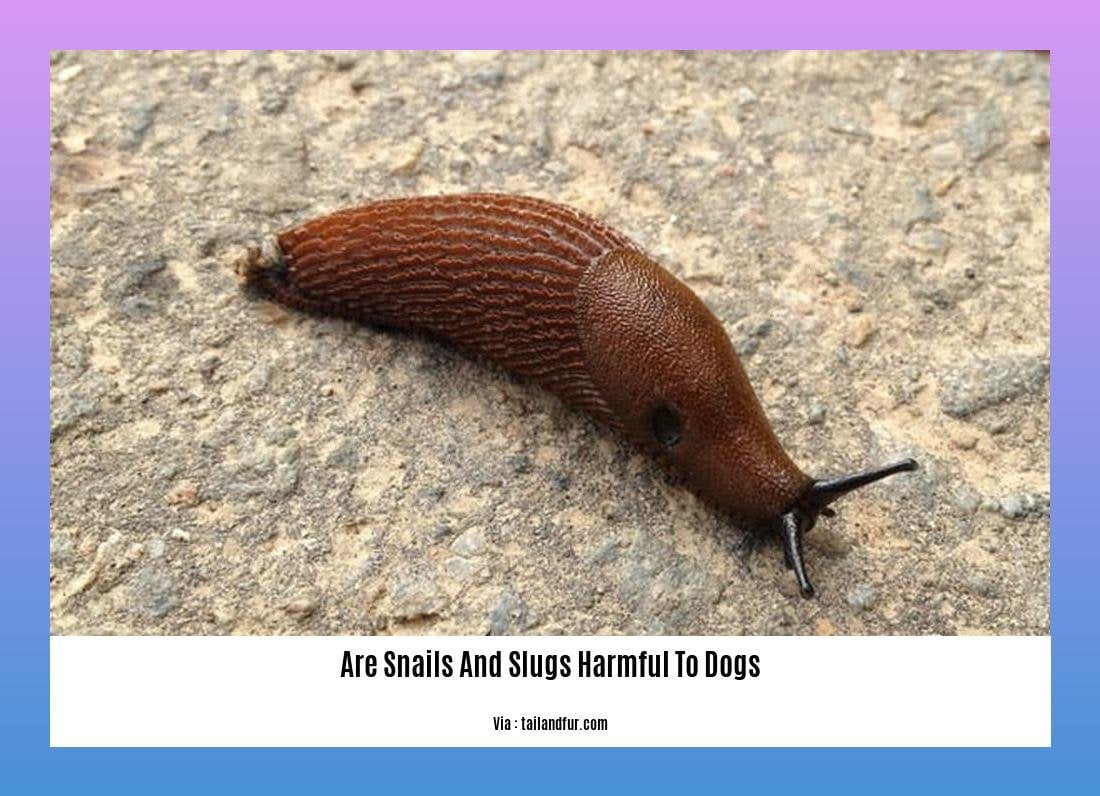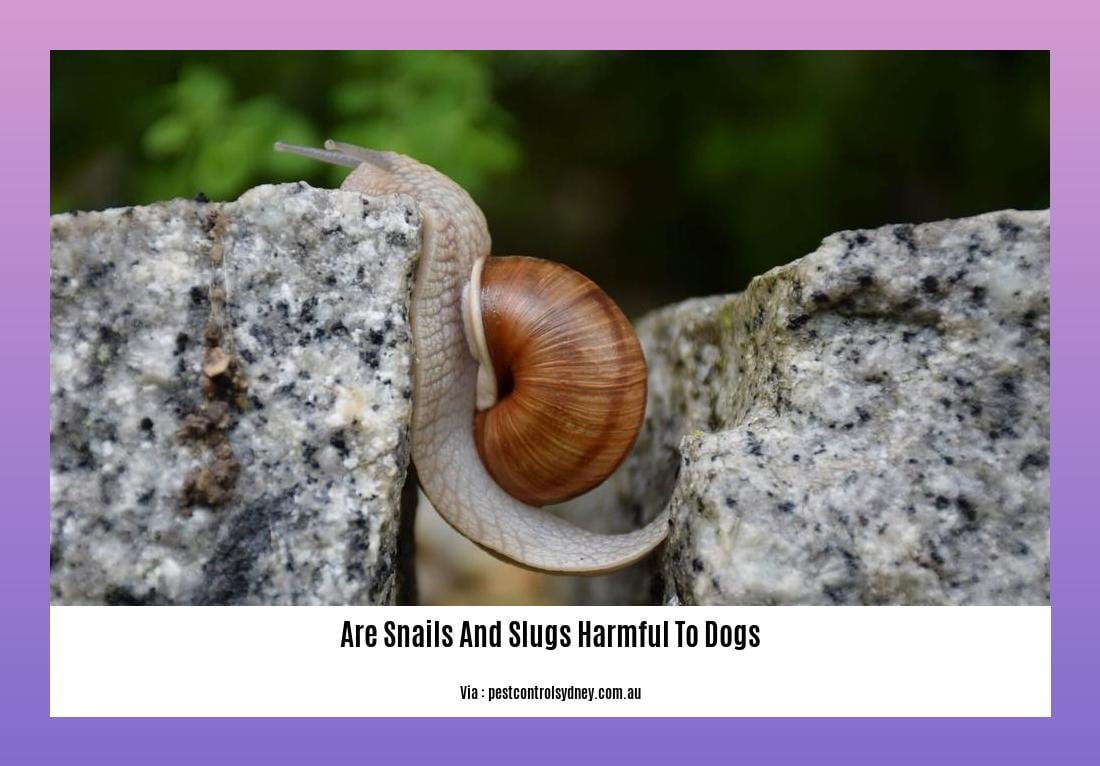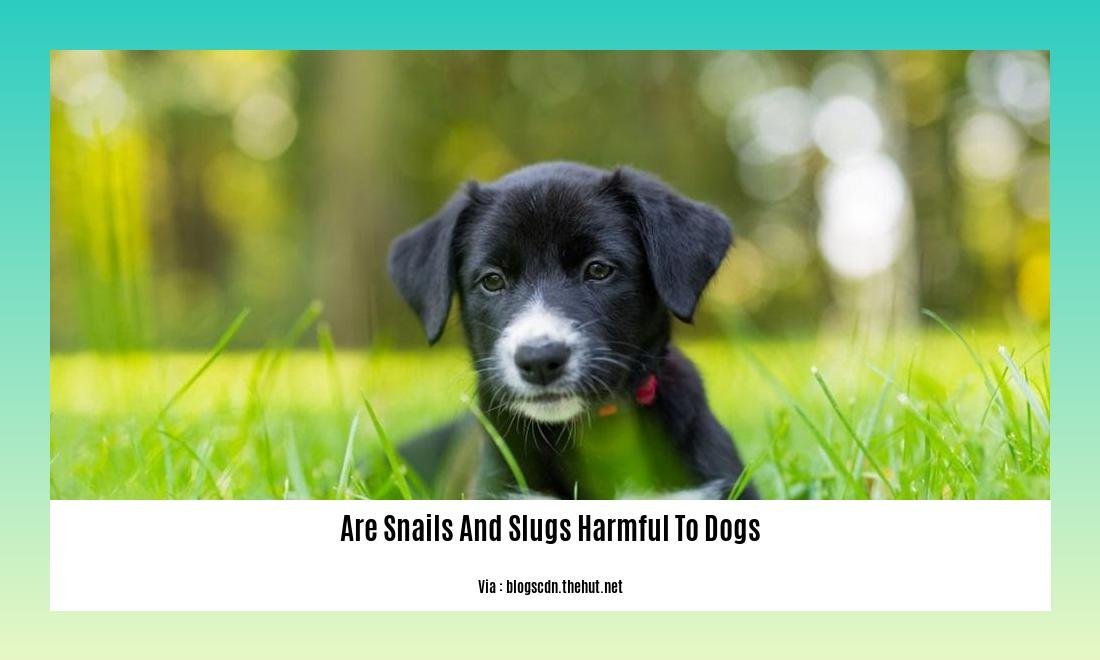Are Snails and Slugs Harmful to Dogs? Unveiling the Hidden Dangers for Pet Owners Dogs are cherished members of our families and ensuring their health and safety is of utmost importance. While we may be vigilant about the obvious dangers to our beloved pets, there are certain hazards that often go unnoticed. In this article, we will delve into the potential harm that snails and slugs can pose to dogs, shedding light on the hidden dangers pet owners need to be aware of. By understanding the risks associated with these seemingly harmless creatures, we can take the necessary precautions to protect our four-legged friends from any potential harm.
Key Takeaways:
- Lungworm, a parasite carried by slugs and snails, can be extremely harmful to dogs and even fatal if they become infected.
- Dogs can become infected with lungworm by eating slugs or snails that carry the parasite.
- Obedience training is important to prevent dogs from eating anything they find outside the home.
- Dog owners should keep a lookout for snail or slug infestations in areas their dogs have access to and remove them quickly.
- Symptoms of lungworm in dogs include coughing, difficulty breathing, weight loss, and changes in behavior.
- If a dog shows symptoms of lungworm or has a suspected infection, consulting a veterinarian for a diagnosis and appropriate treatment is crucial.
- Regularly checking and treating dogs for parasites like fleas, ticks, and heartworms is necessary for their overall health and well-being.
Are Snails and Slugs Harmful to Dogs? Unveiling the Hidden Dangers for Pet Owners

Lungworm, a parasite that can be carried by ordinary snails and slugs, poses a real threat to our furry friends’ health. This often overlooked danger can be fatal if a dog becomes infected. So, let’s dive into the potential harm snails and slugs can cause to dogs and how we can protect our beloved pets.
Lungworm and its threat to dogs’ health
Did you know that dogs can become infected with lungworm by eating slugs or snails that carry the parasite? It’s a chilling reality, and one that pet owners should be aware of. Lungworm infestations can lead to a range of serious health issues for our dogs, so understanding the risks is crucial.
To prevent lungworm, it’s important to educate our dogs through obedience training to avoid eating anything they find outside the home. Snails and slugs can often be found in damp areas, so if your dog has access to such environments, it’s vital to keep a lookout for infestations and promptly remove them.
Prevention, symptoms, and treatment of lungworm
Prevention is key when it comes to combating lungworm in dogs. Besides obedience training, owners should also be aware of the symptoms of lungworm, which can include coughing, difficulty breathing, weight loss, and changes in behavior. If you notice any of these symptoms or suspect a lungworm infection, it’s crucial to seek immediate veterinary advice for a proper diagnosis and appropriate treatment.
A veterinarian will likely prescribe deworming medication to address the lungworm infestation. Remember, self-medication or over-the-counter remedies may not effectively combat the parasite, so consulting a professional is essential.
Other parasites that dogs can get
While lungworm is a major concern, there are several other parasites that can affect our canine companions. Fleas, ticks, and heartworms are among the common pests that can pose risks to our dogs’ health. Regularly checking and treating our dogs for these parasites is vital for their overall well-being.
Now, let’s summarize the main points discussed:
- Lungworm, a parasite carried by snails and slugs, poses a real threat to dogs’ health and can be fatal if a dog becomes infected.
- Dogs can become infected by eating snails or slugs that carry the parasite.
- Obedience training is essential to prevent dogs from eating anything they find outside, including snails and slugs.
- Symptoms of lungworm include coughing, difficulty breathing, weight loss, and changes in behavior.
- Seeking veterinary advice is crucial for a proper diagnosis and appropriate treatment of lungworm.
- Regularly checking and treating dogs for other parasites, such as fleas, ticks, and heartworms, is also important.
In conclusion, when it comes to our furry companions, it’s important to stay informed about the hidden dangers lurking in our surroundings. By understanding the risks posed by snails and slugs to our dogs’ health, we can take appropriate measures to protect them and ensure they lead a healthy and happy life.
Are snails and slugs poisonous to dogs? Find out the answer here. are snails and slugs poisonous to dogs
Are you wondering if snails are bad for ponds? Click here to discover the truth. are snails bad for ponds
Attention fish pond owners! Learn why snails can be beneficial for your pond ecosystem. Check out this article on are snails good for fish ponds.
Are Snails and Slugs Dangerous to Dogs?

Slugs and snails are commonly found in our gardens, parks, and other outdoor areas. While they may seem harmless, these slimy creatures can actually pose a threat to our furry friends. As an experienced veterinary nutritionist, I want to shed light on the hidden dangers that snails and slugs can present to dogs.
Lungworm: A Silent Threat
One of the most significant dangers associated with snails and slugs is the risk of lungworm infection in dogs. Lungworm is a parasite that can be carried by ordinary slugs and snails, and it can pose a real threat to a dog’s health. If a dog becomes infected with lungworm, it can lead to serious health complications and, in some cases, even prove fatal.
Dogs can contract lungworm by consuming slugs or snails that carry the parasite. Therefore, it is essential to be aware of the potential risks and take preventive measures to keep our four-legged companions safe.
Preventing Slug and Snail Infestations
To protect our dogs from lungworm and other potential risks associated with snails and slugs, it is crucial to take steps to control the slug population in our yards. Here are a few preventive measures every pet owner should consider:
- Remove hiding spots: Slugs and snails love damp and dark areas. By removing clutter, such as piles of leaves or old logs, we can eliminate their hiding spots and discourage infestations.
- Maintain a tidy garden: Regularly mow the lawn, trim overgrown plants, and remove any fallen fruits or vegetables that may attract snails and slugs.
- Create physical barriers: Use slug barriers made of copper or coarse materials to protect vulnerable areas of your garden.
- Avoid using slug bait: Many slug and snail baits contain an ingredient called metaldehyde, which is toxic to dogs. Opt for pet-friendly alternatives or consider natural methods of pest control.
By being proactive and taking these preventive measures, we can minimize the risk of our dogs encountering snails and slugs that may carry harmful parasites.
Signs of Slug Poisoning
While common slugs and snails are not typically poisonous to dogs, their consumption can still cause trouble. Dogs that ingest slugs may experience gastrointestinal issues such as vomiting and diarrhea. Furthermore, if a dog ingests metaldehyde, a toxic substance found in slug bait, it can have severe and even deadly consequences.
It is crucial to be aware of the signs of slug poisoning in dogs. If your furry friend displays symptoms such as excessive drooling, muscle tremors, seizures, or difficulty breathing, it is essential to seek immediate veterinary attention. Timely intervention can save their life.
Other Parasites and Preventive Measures
Besides lungworm, dogs can also be susceptible to other parasites such as fleas, ticks, and heartworms. Regularly checking and treating our dogs for these parasites is vital for their overall health and well-being.
To maintain our furry friends’ optimal health:
- Follow a veterinarian-recommended flea and tick prevention program.
- Ensure your dog is up to date on heartworm prevention medication.
- Regularly groom your dog to check for any signs of parasites.
- Keep your dog’s living environment clean and free from potential infestation sources.
By taking these preventive measures, we can minimize the risks associated with various parasites and create a safe and healthy environment for our dogs.
Key Takeaways:
- Lungworm is a parasite that dogs can contract by consuming slugs or snails that carry the parasite.
- Preventing slug infestations and using pet-friendly pest control methods can reduce the risk of lungworm and other potential dangers.
- Slug poisoning can cause gastrointestinal problems, and ingestion of metaldehyde, found in slug bait, can be life-threatening.
- It is crucial to be aware of the signs of slug poisoning and seek immediate veterinary attention if necessary.
- Regularly checking and treating dogs for fleas, ticks, and heartworms is essential for their overall health.
Sources:
1. My Pet and I: Dogs Eating Slugs & Lungworm
2. AnimalWised: Are Snails Poisonous to Dogs?
FAQ
Q1: Are snails and slugs poisonous to dogs?
A1: Common slugs are not poisonous to dogs, but eating them can cause trouble such as vomiting and diarrhea. However, substances associated with snails can be toxic to dogs. It is important to be cautious and prevent dogs from eating snails or slugs.
Q2: How can I stop my dog from eating snails and slugs?
A2: To prevent dogs from eating snails or slugs, it is essential to educate them through obedience training. Teach your dog to avoid eating anything they find outside the home. Additionally, if dogs have access to an area with an abundance of snails or slugs, owners should keep a lookout for infestations and remove them quickly.
Q3: Are snails and slugs dangerous to dogs’ health?
A3: Snails and slugs can pose a threat to dogs’ health by carrying a parasite called lungworm. Dogs can become infected with lungworm by eating snails or slugs that carry the parasite. This infection can be potentially fatal for dogs if left untreated.
Q4: What are the symptoms of lungworm in dogs?
A4: Symptoms of lungworm in dogs include coughing, difficulty breathing, weight loss, and changes in behavior. If you suspect your dog has lungworm or shows any of these symptoms, it is important to consult a veterinarian for a diagnosis and appropriate treatment.
Q5: How can I prevent lungworm in dogs?
A5: To prevent lungworm, it is crucial to educate dogs through obedience training to avoid eating anything they find outside. Regularly check your dog’s environment for snail or slug infestations and take necessary steps to control the population. Additionally, consult with a veterinarian for preventive measures such as deworming medication.
- Unveiling Bernhard Caesar Einstein’s Scientific Achievements: A Legacy in Engineering - July 15, 2025
- Uncover who is Jerry McSorley: CEO, Family Man, Business Success Story - July 15, 2025
- Discover Bernhard Caesar Einstein’s Scientific Contributions: Unveiling a Legacy Beyond Einstein - July 15, 2025















